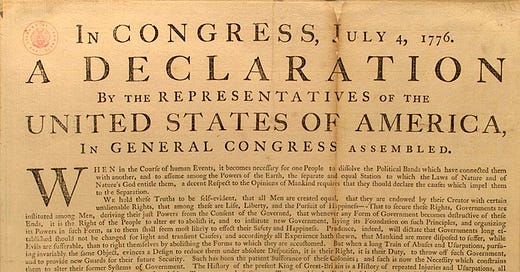A Decent Respect to the Opinions of Mankind: We're Not Alone
People around the globe appreciate the American message marrying God-given rights to personal responsibility. The ascendance of Wokeism, Islamism, and the China model notwithstanding, we have allies.
The American Spirit Essays #36
(continued from Chinese Characteristics)
Are We Lost?
So is all lost? Are we really in it alone? Suppose American Wokeism cuts a deal with China to roll out the Chinese Model fully, concedes that as a non-European people the Chinese are probably superior anyway, and turns the U.S. into a totalitarian state that permits prosperity? Suppose Wokeism then joins China in letting Islamists run wild as long as they do it at someone else’s party? Suppose the EU continues thinking it can be Woker than Wokeism on climate while avoiding the worst aspects of the gender nonsense? Suppose our sister nations of the Anglosphere—Canada, Australia, and New Zealand—continue their own rapid descents into Wokeism (albeit in a mix somewhat different from the American denomination)? Where does that leave those of us still committed to America’s founding spirit and the faith traditions that complete it so spectacularly? Would we really have no friends left on this planet?
The answer is: No. The American spirit preaches a compelling message. It has resonated around the world for a reason. It’s a positive, uplifting, life-affirming message of spirituality. Though it manifests itself differently among nations other than our own, it continues to attract adherents. As Woke as host societies may become, many of their people will always answer the calls of America’s founding spirit and compatible traditional faiths.
Perhaps the most promising recent development in forging our future alliances arrived from an unlikely corner: The Middle East. In 2020, in the waning days of the Trump Administration, the White House hosted the signing of the Abraham Accords. The two principals—Israel and the United Arab Emirates (UAE)—forged the first genuinely warm peace in the entire region since the fall of the Ottoman Empire. Several other Arab states signed on quickly; with only a bit of encouragement from the White House, others might do so as well. While nearly all attention to those accords focused on their implications to the Arab/Israeli conflict, their long-term significance may run even deeper. Of all the world’s societies, few have spent more time aligning tradition with modernity than have Israel and the UAE. These are two societies in which the religious, anti-religious, and even Woke coexist—often uneasily—side-by-side.
Non-American, Pro-American
The hidden message of the Abraham Accords is thus not geopolitical but cultural and spiritual. In the spirit of America’s founding, two societies oriented around deep non-Christian faiths arrived at a place similar to the one that Jefferson occupied in 1776. If we can agree upon a basic platform of decency, morality, and coexistence, we can then follow our own traditions to complete the offering. That makes the Abraham Accords the rare international agreement rooted in a message that transcends the international system.
Other nations have undergone similar struggles to reach similar conclusions. Central Europe’s Visegrad group—Poland, Czechia, Slovakia, and Hungary—are all engaged in the challenge of preserving their unique national characters amidst a movement towards European harmonization and globalization. Brexit proved that many Brits appreciate the genuine exceptionalism at the heart of the Anglo branch of Western civilization—the branch from which America grew. They understand that it’s been under threat. They’re willing to do the work to preserve it. Austria, Scandinavia, and even the Netherlands have begun to demonstrate inklings of the same. Further abroad, India faces its own challenge reconciling its glorious traditions with the needs of modernity.
Keep reading with a 7-day free trial
Subscribe to American Restoration by Bruce D. Abramson to keep reading this post and get 7 days of free access to the full post archives.



